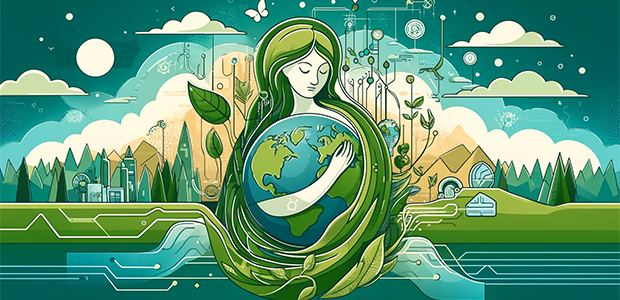
Protecting Mother Earth: The future of innovation and the planet
Decoding the Future of Women is a healthtech conference focused on innovation in the women’s health and wellness space. One of the talks at the conference focused on “Mother Earth. The future of food, water, biodiversity and what that means for women’s health.”
Healthtech and climatetech go hand in hand. As moderator Anna Butterworth put it, “I fundamentally believe that innovation doesn't have to be the antithesis of environmentalism and that they can have a symbiotic relationship with each other.”
All innovations, especially as climate targets are getting closer, should consider and implement sustainable practices. While in startups this is more widely adopted, there is still room for improvement in these smaller businesses, as well as in larger organisations.
As the consumer landscape becomes more knowledgeable and put sustainability at the forefront of their shopping habits, it has become apparent that changing priorities have impacted the way that consumers buy goods. Now, consumers put a bigger emphasis on buying the more sustainable version of a product, and ensure that their money is going somewhere they are happy with it going.
Putting bigger emphasis on more sustainable brands means that brands have had to adapt the way they work and the materials they use in their products. Panellist Dougal Flemming, Innovation Advisor at Clean Growth UK, said: “Every innovation should involve the planet.
“The circular economy essentially gives us a blueprint for how to rethink in-cycle and to think about from cradle to cradle as we take things from the ground where they've come from, how it got here, and how they then return to the ground once they've finished with them. And if you do that, then you have to start thinking with environmental principles in place, the earth in which it's coming from, and indeed the earth in which it goes back to and of course, a whole new cycle, the lifecycle analysis, and particularly the remanufacturer ability of that lifecycle analysis.”
The importance of sustainability isn’t only important for the consumer, but can be seen at the funding stage too. The only VC on the panel, Farah Ereiqat from Pact VC, commented: “As an investor, the first thing that I look at in any startup, whether they call themselves climatetech or not, is what impact they have; whether that's on greenhouse gas emissions, deforestation, or using materials that come from conflict zones. More and more we see that consumers care about this more and more, and we see that people are putting their money where their mouth is. So whether or not a startup labels itself as climate oriented or climate friendly, this is something that we have to look at and we have to measure.”
Not only does being climate oriented and sustainable help the planet, but it also fosters a positive brand image that resonates with an increasingly eco-conscious consumer base. This shift in consumer behaviour means that companies prioritising sustainability are more likely to see an uptick in sales, as customers deliberately choose products and services that align with their environmental values. This trend is particularly evident in the women’s health and wellness sector, where consumers are becoming more discerning about the impact of their purchases on the environment. This has been seen through the rise in popularity of reusable period products.
Adopting sustainable practices can significantly enhance a company’s attractiveness to investors. As Ereiqat noted, investors are evaluating the environmental impact of potential investments. This is not confined to companies explicitly branding themselves as climatetech; all startups are scrutinised for their contributions to reducing greenhouse gas emissions, avoiding deforestation, and sourcing materials responsibly. Investors recognise that businesses with strong sustainability credentials are not only contributing positively to the planet but are also likely to be more resilient and adaptable in the face of regulatory changes and shifting market demands.
As the industry evolves, the drive for sustainable solutions will likely become a standard expectation, influencing consumer choices, brand strategies, and investment decisions alike. This integration of environmental consciousness within the realm of healthtech marks a progressive step towards a healthier future for both women and the planet.

